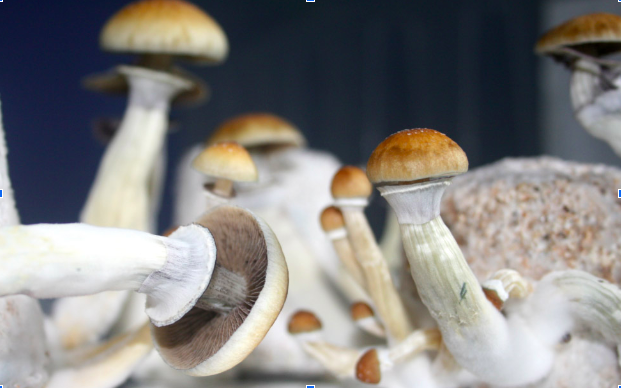Psilocybin: the Miracle Drug of the 21st Century
Psilocybe cubensis, or the Magic Mushroom, is the main source of psilocybin. https://en.wikipedia.org/wiki/Psilocybe_cubensis#/media/File:Mushrooms_growed_with_PF_Tek.jpg
At only six inches tall with a three-inch wide cap, Psilocybe cubensis is an unassuming savior. But when used properly, these Magic Mushrooms have the power to treat some of the most terrible medical conditions of the twenty-first century. PTSD, depression, epilepsy, alcoholism, and many others are all treatable by this small and fantastic fungus.
Magic Mushrooms have a long and complicated history. Shamans and native medicinal leaders have been using P. cubensis as a medical treatment since time immemorial. It is found naturally in the dung of cattle, water buffalo, oxen, yaks, and elephants, making it easy to forage, and its rapid growth and adaptability make it easily cultivated. These characteristics also made it popular with college students and young adults in the 1960s and ‘70s.
Along with other trends, P. cubensis use became a staple of hippie culture. Like many other hippie trends, use of the magic mushroom was tamped down by the Nixon Administration for one key reason: psilocybin, the active component in P. cubensis, is a psychedelic substance. As part of Nixon’s War on Drugs, psilocybin was classified as a Schedule I drug and criminalized nationwide (it has since been legalized in Oregon and various cities).
In the early 2000s, favour for the legalization began to rekindle, and the FDA began to approve more drug tests with psilocybin. A test in the early 2010s revealed something incredible. Mice listened to a noise, then were administered a small electric shock. After that initial shock, no more shocks were administered, but the mice still cowered at the noise. Some of the mice were then injected with a small dosage of psilocybin, while the rest were injected with a saline control. When the noise was played again, the mice injected with psilocybin got over their fear 70% faster than the mice injected with the saline control. “They stopped freezing; they lost their fear,” Dr. Juan Sanchez-Ramos, a co-author of the study, told LiveScience.
Although this has not been tested in humans in the US due to restrictions on psilocybin, it may suggest certain medical uses. “The study in mice indicates that psilocybin […] may help to extinct fear memory in PTSD,” says Franz Vollenweider, director of the Heffter Research Institute in Switzerland. His studies with psilocybin in patients with depression show significant promise as well. “It might well be that psilocybin may shift emotion processing towards the positive in depressed patients,” Vollenweider said.
In another study on depression at Johns Hopkins’ University, patients with depression were subjected to two five-hour psilocybin sessions. Before and after, they were evaluated on the GRID-Hamilton Depression Rating Scale. On the scale, a score of 24 or higher indicates severe depression, 17-23 indicates moderate depression, 8-16 signifies mild depression, and 7 or below indicates no depression. Before the sessions, the average score of the participants was 23. After the sessions, the average score was 8. “Because there are several types of major depressive disorders that may result in variation in how people respond to treatment, I was surprised that most of our study participants found the psilocybin treatment to be effective,” said Dr. Roland Griffiths, a professor of neuropsychopharmacology at Johns Hopkins School of Medicine.
Many citizens are skeptical of Dr. Griffiths’ work, but he assures the public of its safety. “Unlike drugs of abuse such as alcohol and cocaine, the classic hallucinogens [e.g. psilocybin] are not known to be physically toxic and they are virtually non-addictive,” he says, “so those are not concerns.”
In 2020, an estimated 18.9 million Americans older than 12 experienced one or more major depressive episodes. That’s 18.9 million lives easily improvable by psilocybin treatment. “I believe this study to be a critically important proof of concept for the medical approval of psilocybin for treatment of depression, a condition I have personally struggled with for decades,” says Tim Feriss, a philanthropist and entrepreneur. Why do Feriss and the other 18.9 million citizens suffer still? Why are we still unresponsive?


John Dodwell • Jan 16, 2023 at 2:33 am
Psilocybin:In connection with the article on Psilocybin from mushroom: my son took a very small dose 0.05 mg (unknown duration) and has come off a prescribed anti depression drug. I took same dose ( I was told no more than twice a week) on two occasions, for something like the same reason and found that on each occasion I was motivated enough to carry out two tasks which I had been previously procrastinating over for a number of months. The feeling I had was not one of the sky suddenly opening but a crystal clear thought, that instantly without effort was put into action. Maybe demotivation; laziness; too much contemplating; looking at a task for too long trying to seek perfection; fear of not being able to achieve something, so don’t start it; are the same symptoms which may be positively influenced by this interesting drug. I thought my personal experience may be interesting.